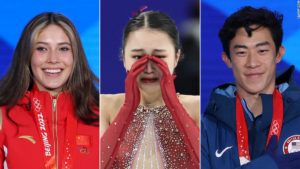Interesting reactions in both the US and in China to Olympic athletes who grew up in the US but whose families have roots in China. These individuals are often referred to as ABC’s: American-Born Chinese. As is true with immigrant groups in the US generally, Chinese-American families are diverse, from first generation families speaking mostly Chinese at home to long established families in the US, assimilated in many ways, to many stages in between. Yet, when ABC’s go to China, those distinctions are often not recognized or acknowledged. If you look Chinese, the expectation is frequently that you should not only be familiar with Chinese culture and customs (food for example), but also that you are able to speak Mandarin.
The expectations from the Chinese is the same for those athletes as for any ABC’s. So there has been severe criticism for those who don’t speak fluent Chinese, including Nathaniel Chen, who won gold in figure skating. The harshest criticism however, has been leveled at figure skater Zhu Yi, who gave up her American citizenship to represent China (and changed her name from Beverly Zhu). The attacks were in part a result of her poor performance at the Games, but also reflected her less than perfect Mandarin language skills. On the opposite end of the spectrum is San Francisco native and freestyle skier Eileen Gu, who also chose to compete for China (she is known as Gu Ailing in China). When she won gold last week, the congratulations pouring in temporarily crashed China’s leading social media platform, Weibo. Gu speaks Chinese fluently (reportedly with a Beijing accent) and also is well known as a fashion model and Internet influencer.
My experience in China is that if are foreign and don’t look Chinese, but speak some Chinese, even if poorly, you will be received very favorably. That’s been the case for me as a white American. If you speak Chinese fluently, as does my oldest son, Chinese people will be amazed and effusive in their praise. There is zero expectation that foreign tourists learn the language that popular opinion among Chinese themselves consider to be very difficult. However, if you look Chinese, the expectations are totally different.

Interestingly, there are also a large number of people online who hate Gu Ailing. Especially the “highly educated” group (no offense, but it’s hard to simply explain the different online communities in China) because of excessive marketing. Those who hate Gu Ailing have completely different views from those who hate Zhu, not just because of language or culture. There are many complicated reasons behind it, but the main part can be interpreted as: Some netizens think that Gu Ailing represents some kind of refined egoist. These people also think that Gu Ailing’s nationality is complicated(There is no evidence that she has renounced her U.S. citizenship, and most speculate that she is currently dual-citizen. Dual citizenship is illegal in China and most Asian nationals. She has enjoyed some kind of preferential treatment granted by some powerful organizations.)and her mother is a smart marketer. She’s like China’s Kim Kardashian, but in a different field.
The almost one-sided criticism of Zhu is more complex, with many dramas. Even though she doesn’t speak Chinese, most netizens would refer to her as being more “like” (not just genetically) a Chinese. Such as a certain imperfection. More people hate the bureaucracy and some kind of “corruption” she represents than the person herself. She was originally ineligible, but her father was an influential scientist in China. She replaced the position of another welcome skater, “Little Flame”. This made many angry, who criticized her for stealing other people’s dreams through privilege. To a certain extent, this is also the rebellion of today’s young people against the government and power people.